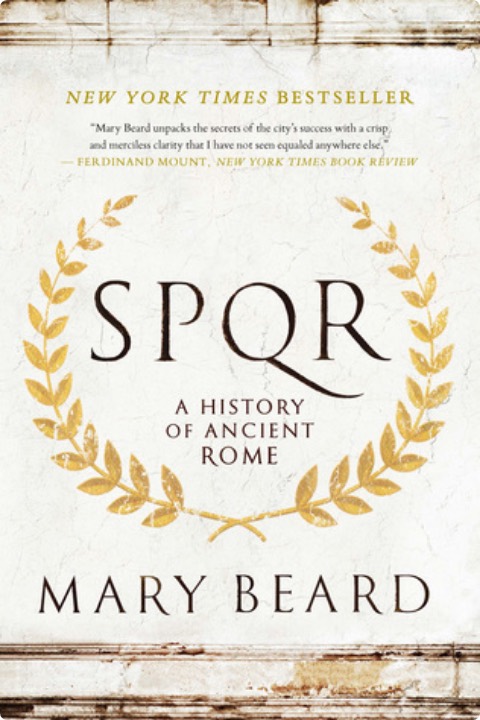Having rattled and routed Mark Antony and his bewitching Egyptian at the battle of Actium in 31 BC, Octavian was on his way home to Rome when he was confronted by some punter. The man produced a talking raven, which obligingly squawked, ‘Greetings, Caesar, our victorious commander!’ Octavian was delighted at this evidence of loyalty, and rewarded the bird-trainer accordingly. However, it later emerged that the man had had another raven in reserve, which he had taught to croak, ‘Greetings, Antony, our victorious commander!’ He hadn’t been taking any chances.
Nor, in a sense, does Mary Beard in her ambidextrous history of Ancient Rome, whose title proclaims her bifurcated programme. SPQR stands for Senatus Populusque Romanus; that’s to say, ‘the senate and people of Rome’. (The letters are embossed on drain covers in the streets of Rome today.) She has chosen it partly for its snappiness, and partly because her aim is precisely to give as much space to the populus as to the senatus, challenging the priorities of historiographical has-beens such as Edward Gibbon, more interested in grandees than groundlings.
This two-facetedness pervades the pages of SPQR. It’s even embedded in the author’s name, and her twin professional roles of senatorial Cambridge professor (Beard) and popular television presenter (Mary). Am I calling her Janus-faced? I am, but in a positive sense. It’s true that I found the first third of her book hard going, but that’s largely because she was calling into question stories about which I knew practically nothing. Once it reached the more familiar territory of the centuries flanking the birth of Christ, this iconoclasm came to seem invigorating, and, in the end, kind of revolutionary.
Julius Caesar, it turns out, definitely wasn’t born by Caesarian section. Cleopatra probably wasn’t killed by an asp. The emperor Claudius almost certainly wasn’t a doddery old dear. And Marcus Aurelius, known for his Stoic wisdom, was sometimes downright platitudinous. ‘Do not act as if you were going to live 10,000 years,’ he admonished ‘Death hangs over you.’
It’s notable here that Beard herself refers to his philosophical musings not as Meditations, which is the normal form, but Thoughts. It’s linked to her compulsion for retranslating the titles of ancient works to make them seem more approachable. The trouble is, they often end up sounding like bad Nick Hornby novels. Thus Xenophon’s Anabasis becomes Going Up, while Augustus’s Res Gestae emerges, disastrously, as What I Did.
There were other things I didn’t like. Occasionally the language of the lecture hall creeps into her prose, as in her penchant for referring to our ‘dialogue’ with the ancient world, and the ‘debate’ that encircles certain subjects. These are turn-off terms: senatorial, not popular. We can debate it if you like, but take it from me, they don’t crop up in many of the dialogues I have with my friends.
Nevertheless, these complaints were dwarfed by the accumulative force of this book, which is considerable. It isn’t just the buzz of being encouraged to reimagine everything, although there is an undoubted thrill when, on page 404, she lets slip, in most un-Beardlike fashion, the take-home insight that whatever the views of Suetonius and other ancient writers, the qualities and characters of the individual emperors did not matter very much to most inhabitants of the empire, or to the essential structure of Roman history and its major developments.
It isn’t only the amusement of being reminded that ordinary Romans were, in certain ways, a lot like us. They found fart jokes funny, for example. (And let’s be honest, who doesn’t?) It isn’t even the dizzy shock of learning that a few aspects of the life and character of Cicero are actually quite interesting. No, it’s the headiness of discovering what is, at least to me, a whole new approach to ancient history. You don’t favour the senatus, but nor do you favour the populus. You retain the two in tandem. You don’t dismiss everything you know as wrong. But you realise that, in almost all instances, you don’t know if it is or not. It could be this. It could be that.
The challenge is to hold in mind simultaneously a pair of opposing ideas (a knack F. Scott Fitzgerald referred to as ‘the test of a first-rate intelligence’). The phrase ‘impossible to know’ appears 13 times over the course of SPQR. That may not sound like the most exciting of conclusions, but in cases where the evidence is partial, or fragmentary, or non-existent, it must be the right one.
To return now to the anecdote with which I began (having borrowed it from Beard), that bird-trainer didn’t know who was going to win the battle of Actium, so he trained two ravens, each of them primed with a different message. Mary Beard, too, always has two ravens at the ready. Welcome to the contemporary, contemporaneous voices of ancient history. They come to you in stereo.

